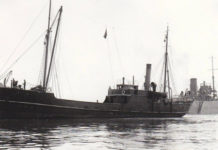The Twomeys’ last memory before the fatal moment might have been the sound of sirens and the flashing of police-car lights. Then 26-year-old Marek’s car hurtled onto the wrong side of the dual carriageway, and crashed headlong into them – killing 16-month-old Oisin and his unborn sister at the scene, and causing the death from injuries of the driver, their 39-year-old father, Con, 10 months later. The mother, Elber Twomey, was the sole survivor of the family from Meelin in North Cork, who had been holidaying in Devon in July 2012.
The Polish driver had earlier left a long suicide-note after an argument with his wife. He panicked fatally when police pursued him as a ‘person at risk’.
Almost four years on, Elber might agree that she’s beginning to emerge from trauma She told journalist Graham Clifford (Irish Independent) : her strong faith has seen her through the darkest of days and continues to sustain her.
“Before the crash I would have had a reasonable level of faith, I suppose, which I would have got from my parents. We would have gone to Mass every weekend. And when Con and myself put Oisin to bed every night, we’d say his bed-time prayers”.
Herself a primary teacher, Elber reflects: “Oisin should be starting school this coming September…It’s still difficult [to be around] little people”. Catching sight of a young family passing by, she seems to latch-on to the contrast – suddenly sensing her own emptiness : “Sure, if this was all we had – I wouldn’t be here”. Then she recovers, remarking : “I do believe when I go, they will be there waiting for me”.
Underlying her positive attitude (according to the Echo’s Elaine Duggan) ‘is the belief that one day she will be re-united with all of those she has lost’. This helps her to go on : “My heart goes out to those who don’t have faith. I believe we are just passing through this life”.
Faith doesn’t ‘airbrush out’ suffering I am featuring Elber’s story during these weeks of Lent – the season leading up to our commemoration of the suffering, dying and rising of Jesus on the first Good Friday and Easter Sunday (and I hope to return soon to the several ways in which Elber is re-building her own life).
What emerges clearly from her effort to deal with the experience, is her conviction that : The degree of suffering which can cross our paths is so great, that it cannot be absorbed by any horizon which fails to include the belief in a final mode of existence – where the darkness and the pain will all make sense within a higher plan.
Every year on the anniversary of the crash, Elber tells us, “I’ll just drive to a beach somewhere – I find being-by-water calming and helpful. Last year…I got in the car and headed for Waterford – turned off my mobile – and had a day on my own”. But before leaving, she had attended Mass – as she does most mornings.
During Lent, as I say, we meditate upon the basic truths of the Christian religion. We call to mind once more that the Christian faith is anchored in a reality which goes beyond the data of our everyday earthly observation.
Yet we are sometimes told today that we should jettison this kind of belief – in favour of a more ‘enlightened’ kind of religion which would teach people to be caring towards one another in the here-and-now.
Strength above and beyond ourselves
In contrast to this viewpoint, however, our Christian faith takes its starting-point from the reality of God in Jesus making us the offer of an eventual unending life with the risen Jesus himself. It is on that basis that we get the opportunity to accept the help and strength of Jesus’ own Spirit – giving us the impetus to reach out in care and support of the people around us…This is the Christian faith which was the mainstay of Elber Twomey’s courage all through her ordeal.
Indeed, she had to go through a double trauma. First, there was the crash itself, the shock, loss and grief. Daily she still visits the grave of her husband and children; no day goes by when she does not cry.
But on top of that came the trauma of struggling with long-drawn-out injury : first, injuries to her own back and head – and then the multiple injuries to her husband (abdomen and brain, along with collapsed lung and broken ribs).
For the first 18 months after the tragedy, Elber was getting no more than an hour or two’s sleep at night. “I’m not doing too badly, I suppose”, she sums up. “I’m trying to get some kind of routine into my life – I’m making an effort to live”. In other words: mobilizing every ounce of any personal resources she can call on. That is what it takes to survive.








